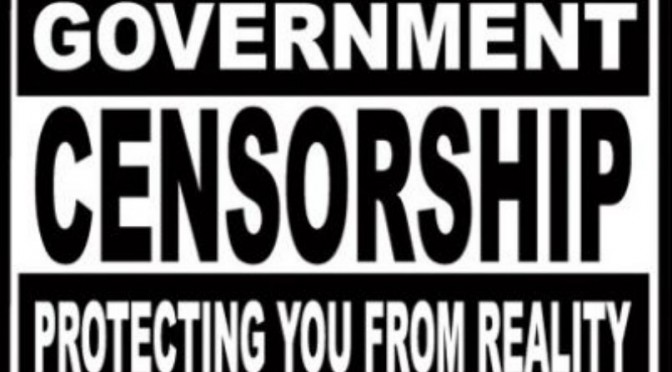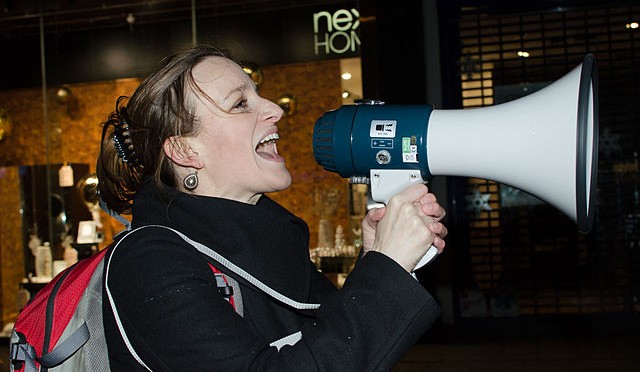I’m featured in this programme: Journalist Nichi Hodgson asks whether there’s scope for an ethical code for producing porn
Source: ▶ BBC Radio 4 – Can Porn Be Ethical?
I’m featured in this programme: Journalist Nichi Hodgson asks whether there’s scope for an ethical code for producing porn
Source: ▶ BBC Radio 4 – Can Porn Be Ethical?
Trans activist Jane Fae has been blocked from speaking at the Feminism in London conference, because she holds positive views on pornography. This, despite the fact that her speech had nothing to do with porn. Read Natacha Kennedy’s scathing article…
Source: UnCommon Sense: Silencing! Censorship! Until we do it…
Myles Jackman is a lawyer driven by the need to overturn Britain’s ludicrous and censorious laws about sex and sexual expression. He often works pro-bono and is now reaching out for support in order to continue his work. Please follow the link below for more details.
Yet another academic study has cast doubt on a commonly made accusation against pornography: that it causes misogynistic attitudes. This accusation is often thrown to imply that porn leads to sexual violence – although many studies have already dismissed this idea.
For entertainment value, the quotes from comedy anti-sex feminist Gail Dines are worth reading. Among other things, she’s concerned that people might be having threesomes.
Many fans of pornography might even be ‘useful allies’ in women’s struggles for equality in work, income and public office, the researchers argue
Source: Watching porn does not cause negative attitudes toward women, contentious Canadian study finds
Think of the children!
In a sign that the times, they are truly a-changing, Channel 4 looks at porn as sex education, rather the eternal ruination of our children’s souls. What a shame then, that the UK government is currently looking for draconian ways to stop all under-18s from accessing online porn.
Sex in Class aims to fix Britain’s blushing attitudes (and high teenage pregnancy rate) with help from a leading sexual health expert
Source: Sex in Class: Channel 4 brings pornography into the classroom – Telegraph

Last December, a law – known as AVMS 2014 – was snuck into force without a parliamentary debate. This law had two aspects: one of which was largely ignored. The part that wasn’t ignored criminalised the distribution of porn stronger than the BBFC’s tame R18 classification. This effectively outlawed the depiction of acts considered beyond-the-pale by the British establishment, even though these acts are perfectly legal to carry out in private, and provoked the memorable face-sitting protest outside Parliament.
The aspect of AVMS 2014 that the coverage largely overlooked related to age verification, making it mandatory for adult video providers to confirm that each visitor is over 18 before allowing them to see any form of explicit image or video. Arguably, this part of the law was far more significant, but on the surface seemed more reasonable. This regulation has actually been enforced by ATVOD since 2010: the 2014 law merely strengthened the existing rules.
But demanding age verification by adult service providers has far deeper implications than might be immediately obvious, and ones that inevitably have implications for the existence of an uncensored Internet.
The first problem is that, whatever the means of age verification, there will be adults that cannot get through it. Current age verification solutions include: using a credit card; providing passport or driving license details; using a mobile phone that has already been age-verified. But many adults cannot provide any of these things, and furthermore many wouldn’t want to, for privacy reasons.
Unfortunately, the UK has no strong protection against censorship, but the US does: and in America, the Supreme Court has ruled repeatedly that onerous age verification is undoubtedly censorship, so cannot be enforced by the state. So in “conservative” America, the legal system has far more problem with adults being prevented from watching porn than in “protecting children” from seeing it. The greater harm (according to the judges) is censorship, not smut: this is as America’s founding fathers intended, as they knew that censorship can be introduced for all manner of spurious reasons, and once initiated, it tends to grow.
The AVMS regulations are laid down by the EU. But here’s the odd part: only the UK has decided that AVMS requires an expensive, activist regulator along ATVOD lines; only the UK has interpreted the AVMS scope to include adult websites (the regulations were originally designed to cover TV catch-up services); and only the UK has interpreted the regulations to mean that adult websites should implement age verification.
Here’s the real, huge problem with all this. How can regulations that only cover UK-based web businesses have any meaningful effect? There are two possible interpretations: either, that ATVOD is an expensive but powerless quango, or that the government will introduce blocking of overseas adult websites on a mass scale.
Until recently, the latter option sounded like a conspiracy theory, but during the general election campaign, the Tories announced they would be blocking sites that don’t conform to AVMS. This would require the creation of an official UK Internet censor – the first such thing in any democratic society – and probably entail the blocking of millions of sites that are considered unsuitable for children.
Aside from censorship, privacy is the other major concern. Age verification providers will know which sites each user is trying to access. Is it acceptable and necessary that one’s credit card provider, mobile provider or other authority could know you tried to access BustySpankedSluts.com last Friday night?
Evangelists for age verification suggest that this problem could be averted by the creation of an “anonymising hub”. This would shield the adult site and the age verification service from each other, so that the site operator need not know your mobile number, and O2 will never know you had a wank to BustySpankedSluts.com.
But potentially, the hub multiplies the privacy issue. Now, there is a central database linking individuals to porn sites. Who would have the right to access, browse and search the database? Would the police ever have reason to request to access it? Would some alliance of hackers steal and publish data, just to prove they could, or use it for blackmail? Once this data is stored in a single place, the privacy implications are astounding.
ATVOD sets the age limit for accessing pornography at 18: it therefore defines 16 and 17 year olds as children, despite the age of consent being 16 in the UK. This means that debit cards can’t be used for age verification, as they can be issued to 16 year olds, and so makes age verification more onerous (many adults don’t own credit cards).
It’s worth a reminder at this point that the AVMS restrictions are predicated on stopping minors from viewing content that “might seriously impair” them. And yet, research carried out by Ofcom on behalf of the UK government, as well as research carried out across the European Union, is unanimous: no evidence can be found that pornography is capable of “seriously impairing”, and in fact the government’s own evidence suggests that pornography is associated with a reduction in harm. (Ofcom report – key finding is bottom page 15/top page 16).
All of this overlooks a simple fact: child protection filters are standard these days on all devices, from tablets and phones to PCs. Family brands like Tesco – which have reputations to maintain – sell their own child-friendly tablets. But such filters don’t empower or enrich regulators. Nor do they help make the case for censorship, or provide the opportunity to snoop on citizens, so they are ignored when the case for age verification is made.
While most EU authorities have thus concluded that there is no need for server-side age verification, Ofcom, ATVOD and the Department of Culture, Media and Sport have decided otherwise, and have implemented a “precautionary” system. This seems akin to fitting expensive locks to all fridges, in order to prevent teenagers freezing to death in the kitchen: it’s never happened, but you can’t prove it never will, can you?
A wonderful article in Vice from Frankie Mullin: As sex workers are pushed out by gentrification, London is selling people a twee, sanitised facsimile of sleaze.
Source: ‘Brothel Chic’ Is Turning Soho into a Twee, Sex Work Theme Park | VICE | United Kingdom

This Tuesday I appeared on a panel at the National Theatre to debate pornography and its cultural impacts. Joining me in the red corner was the feminist porn producer and performer Pandora Blake. In the blue corner were Heather Brunskell-Evans of Resist Porn Culture (an apparently new anti-porn group; don’t we have enough?) and Kate Smurthwaite, the comedian, writer and anti-sex feminist activist.
It wasn’t the easiest of debates; not because of the subject matter, but because of some heckling from the anti-porn speakers and certain members of the audience (Pandora recognised at least one audience member from other events – there were clearly a number of activists in attendance). This gives reassurance: when one has evidence and reason on one’s side, heckling is unnecessary.
Of course, nobody ever admits they’re anti-sex, for obvious reasons: if you’re trying to get people on-board with an anti-porn message, looking like a fundamentalist doesn’t help your cause. So when I chose to talk about the anti-sex, rather than anti-porn movement, my choice of words was questioned. In attempting to answer (I was cut off more than once), I pointed out that Smurthwaite, appearing in an anti-porn guise at this event, is a supporter of a variety of other, puritanical causes. I had printed out a tweet of hers in preparation for the event; when I tried to read it, Smurthwaite shouted over me, and threatened to walk out if I read it (I backed down – which I regret, in hindsight).
So here is the tweet which Smurthwaite (@Cruella1) was so determined should not be heard:

@gingerrobbers is a stripper, and as I interpret the above, Smurthwaite is blaming her choice of career for women being raped.
This is, of course, a disgusting thing to say, and surprising from a feminist, since it blames rape on women’s behaviour, rather than on rapists. It’s also a lie: there is no evidence that strip clubs and other forms of sexual expression cause men to commit rape.
Blaming sexual expression (and thus, women who undress in public) for rape has always been a feature of anti-sex feminism. Catharine Mackinnon, an American pioneer of anti-sex feminism, actually went so far as to suggest that a rapist/murderer should be freed, and instead the porn industry put on trial, because he had watched porn prior to committing the crime, and so was not responsible for his actions.
It also demonstrates that the ‘anti-porn’ label is misleading. I have never encountered an anti-porn feminist who is not also anti-striptease, anti-prostitution, or anti-sexual expression that goes far beyond what most people would consider pornographic.
It is for this reason that the anti-sex campaigner Gail Dines coined the term ‘pornification’, which is popular today in the anti-sex movement. It is designed to imply that all sexual expression, however soft, is somehow pornographic in origin and intent, and so proof of the insidious influence of porn across our culture. Thus, Beyoncé music videos, Page 3 of the Sun, sun cream adverts and lads’ mags are all examples of ‘pornification’… created by the river, the torrent, the TSUNAMI of filth that (they say) bombards us on a daily basis.
So if a person attacks every possible known instance of sexual expression as harmful and dangerous, how could they not be anti-sex? I have always wanted to ask Dines, Smurthwaite and their colleagues in the Porn Panic industry to explain what expression of sexuality they would find acceptable; perhaps a Ministry of Smurthwaite could be established to approve erotica that – according to the puritans – does not demean, degrade, objectify or otherwise ‘harm’ women. One suspects it would be a small, sad and sexless library of content.
So I don’t apologise for referring to such types as anti-sex rather than simply anti-porn. I use the term with care.
I’ll be taking part in this panel discussion about the play We Want You To Watch. If you’re in London, feel free to come down, listen and contribute. It will, no doubt, be a lively debate!
Source: We Want You To Talk | National Theatre | South Bank, London

The Porn Panic – my name for the rising tide of scaremongering against sexual expression over the past decade – has followed familiar paths. As religion has declined in this country, so pseudo-science has risen to take its place. Attacks on normal sexual behaviours, once wrapped in biblical terminology, have evolved in step with the new, “enlightened”, times.
Sexuality may be impossible to switch off, but fear and guilt can be instilled to stigmatise and control sexual behaviours. Once it’s branded abnormal, a sexual behaviour can be attacked and suppressed, all in the name of helping the victim. In this way, “medical conditions” ranging from nymphomania to homosexuality have been attacked, stigmatised, and then turned into profit-making vehicles for peddlers of cures.
As already outlined on this blog by psychologist Dr David Ley, porn addiction is at the very least a dubious concept. But this has not stopped the media from promoting the condition as a genuine one. In recent months, the Porn Panic appears to have swung from a primarily feminist attack on sexual expression (under the “objectification” banner) to a pseudo-medical one.
A particularly blatant example appeared recently on the BBC’s yoof-news channel Newsbeat, where a young man’s “cure” from porn addiction was trumpeted without a shred of scepticism. The story was based on a self-diagnosis by a 23 year old who had found that his “porn addiction” was leading him to watch “pornographic content that disturbed him” – although the nature of the content wasn’t revealed. The article then introduced an expert, Robert Hudson, who said:
“The first thing we ask them to do is stop masturbating for 90 days”
This sounded familiar: masturbation-as-sin has been a target for centuries, and has long been stigmatised under a variety of pretexts. It has only been in the Internet age that much of the stigma has been lifted, and people have felt more free to admit that they, too are wankers. It is now well known that masturbation is good for both physical and mental health; we also know that it is an outlet for pent-up sexual frustration. This advice seemed deeply troubling to me, so I approached Dr Ley for his thoughts, and he agreed:
“It’s disturbing to me when people recommend giving up masturbation for 90 days. I always wonder how they treat “oxygen addiction?” Should I give up breathing for 90 minutes?”
He continued:
“The sad fact is that teenagers and teenage boys especially, need lots of support to understand, talk about and express their sexual feelings. We don’t allow that, so these young men go to porn instead. Blaming problems on porn is like blaming Fast and Furious movies for a speeding ticket. Society has a responsibility to teach people about sexual health, and sadly, we’ve neglected that responsibility.
Porn isn’t addictive: excessive use of porn reflects libido, sexual shame, and an inability to understand and discuss one’s private sexual desires. When we allow young men and women to safely discuss and express their sexual needs, even those we are afraid of, this pseudoscientific concept of “porn addiction” will vanish.” [My highlight]
“Regardless of whether porn addiction is “real,” Grubbs and his co-authors note that perceived addiction has been linked to several real elements of psychological distress, such as depression, compulsive behavior and anxiety.”